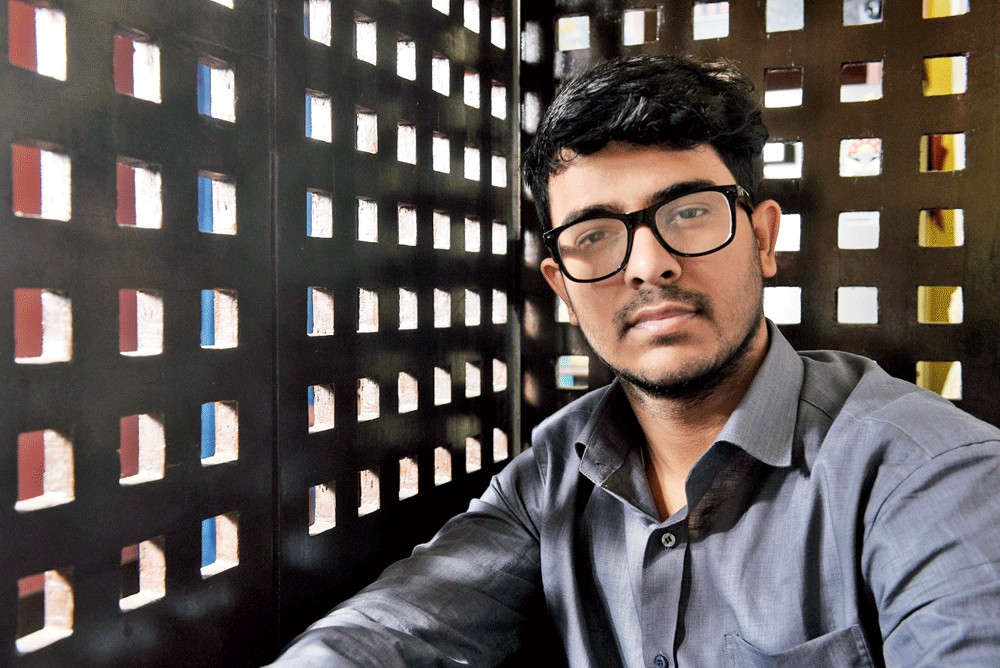He is all of 20 and knows exactly what is going on in your mind.
Ranaditya Sengupta calls himself a “mentalist”, a mind-reader. Which means that with him around, you many end up changing your ATM PIN, for he may call you up on the stage, take a good look at you, and, without knowing you or anything about you, disclose on a screen behind you those four digits that you thought were hidden deep in the recesses of your mind.
Or touch one person and make another person feel the touch. Or make you forget how to read. All on stage.
Thrilling, if you don’t mind looking completely dazed in public. So people often flock to see him perform.
Ranaditya, a resident of Dum Dum, and I meet at a café at a central Calcutta mall. The third-year English honours student at Bhawanipore Education Society, who has a very determined face and looks straight into your eye, keeps his phone, face down, near me, at my end of the table. “We will look at it at the end of our conversation,” he declares.
I request him to read my mind. He asks me to visualise someone I know and write the name of that person on a piece of paper. From the way I hold it in my hands behind my back, he figures out that the person is a woman. Quite crazy, but this is only the trailer.
In the next few minutes, he asks me a series of random questions, and takes me through a series of random acts. I am sped through the English alphabet, made to stick out one hand, then another, and then voila! He says the name, with all its seven letters firmly in place. Ok, he just gets the positions of two consonants wrong, but they are interchangeable.
I gasp. How can a name just bobbing inside my mind be deciphered like that, without any context whatsoever?
“But this is not magic. Or anything psychic. This is mentalism. Everything I did can be explained scientifically,” Ranaditya says.
He figured out everything by reading me closely, he says. He studied my speech, my body language, my expressions. “A mentalist uses psychology, body language, verbal influencing and mnemonics.” He would not divulge how exactly he got the name, but it was clear that there was indeed a context, a rather detailed one, and he had made me establish it.
All the while I was dropping clues by the dozen about what was going on in my mind, unknown to me.
There’s a bit of an anomaly with magic here, one feels. Mentalism is not considered a science by everyone, and historically, belongs to the family of magic.
Magic, by the way, in its trendy, new-age, hocus pocus-free version, is no longer called magic, but illusion. Mentalism is best considered under the category illusion: it is magic and it is not. Ranaditya is bent on erasing mentalism’s associations with mumbo jumbo. One of its strategies is “induction”, which is the same as the age-old hypnosis. “But induction is different from conventional hypnosis because you feel everything that’s going on around you. Though you don’t care and you enjoy it and you are a willing participant,” he says.
He began to take an interest in mentalism from the time he was around 13. He had watched a programme by renowned mentalist Derren Brown on TV. “Something clicked in my head,” says Ranaditya. Going into another person’s mind is that dizzying prospect — and not only for an adventurous child.
In a TED Talk video, Ranaditya’s first inspiration Brown, who has a shimmering personality, also talks about reality, magic and mentalism. He uses the word magic in the larger sense of the word, as creating something out of reality, not as trickery.
“Magic is a great analogy for how we edit reality and form a story and then mistake that story for the truth.” With a chuckle, he adds: “Mentalism is the dubious art of getting inside your head.”
Only, it is not “dubious”.
Ranaditya has trained his mind in a certain way. He has worked very hard for many years.
In those first days, Google was not what it is today. He read whatever he could lay his hands on, and started practising his skills on friends and family, sometimes till they begged for mercy. He read books on psychology, statistics, body language.
Already a professional, Ranaditya performs at restaurants or private parties, or on stage. He has performed at Ultratech, TEDx and on Star Jalsha. He prefers the stage. “At restaurants I have to table-hop. But with a group as an audience, I have authority.”
He is part of a group called Kalkutta Konjurors, which hosts open mic events on the first Sunday of every month at Studio Pepperfry, Salt Lake. He may adopt mentalism as a profession. If not, journalism.
Before leaving, he asks me to think of a four-digit number. After, again, what seems a random set of questions, he says that his phone will show a number less than the number I have thought of by 1.
He picks up his phone. It shows the number 1981. I had thought of 1981. He had not touched the phone throughout our conversation. “This is called influencing,” he says.
He also offers to tell me my ATM PIN, but I decline the offer.











